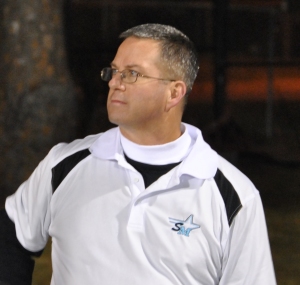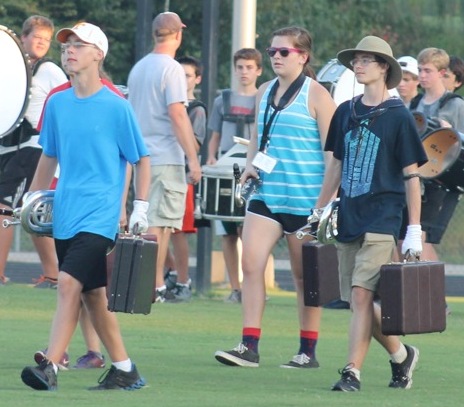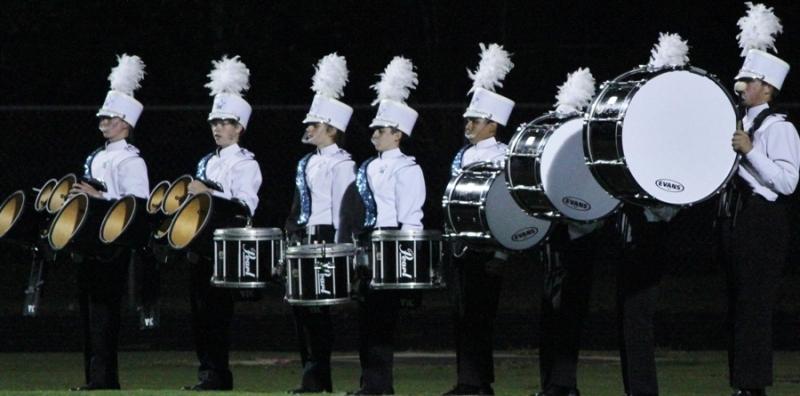King reveals his hidden ‘fortes’
Percussion members await Daniel Goorsky’s signal to start their performance.
April 22, 2015
High school band directors like Scott King juggle many responsibilities, but when they direct four bands like he does, their responsibilities can build to a crescendo.
Besides the obvious duties of conducting his bands and teaching his classes, King’s job includes some hidden ones too. He wrote the score for The Panther Pride Marching Band’s fall performances, directed the drill, ran band camp from 8 a.m. to 7 p.m. for a week right before school started, and traveled with the marching band to their competitions during the fall marching season.

Scott King looks over the marching band as they load their equipment into the marching band trailer after one of their competitions.
He also conducts Concert Band, Wind Ensemble, and Jazz Band all year long. “Mr. Johns and I constantly have two to three pans in the fire,” King said. Christopher Johns is the assistant band director. Additionally, King also attends and participates in annual conferences with the Georgia Music Educators Association as a judge for the All State Committee and other groups.
“I’ve been teaching for 27 years and have been involved with marching band for 38 years,” said King, “and I’m still learning new things each year. I’m always looking for ways to make the music and drill better and more exciting while also being more efficient.”
He said it’s still difficult to master teaching marching band and classroom material. King came to the Mill 13 years ago, but he has actually been writing the drill for marching band for 15 years. “I knew the previous band director,” King said. “I enjoyed writing the drill, and I knew that my band wouldn’t compete against the band here,” said King of his former school.
King, who has three music degrees, a Bachelor of Arts degree from Jacksonville State University, a master’s degree from VanderCook College of Music, and an educator specialist’s degree from Auburn University, wrote an original score and drill for the band’s fall show, “When I Met You.” It wasn’t his first original score. King also wrote “Viva España” two years ago.
He said that the six songs for “When I Met You” functioned “basically like a soundtrack. When I write our shows, I think about our strengths and the musical education that each student will receive,” King said. “I also think about the audience and judges’ appeal, and when I was writing the show, I pictured a scene and the choreography and then proceeded to write a melody to go with each of the songs.”
King said he started writing and choreographing the music for his score about a year in advance and was still making the final revisions right up to the band’s first competition in September. He said he was inspired by the movies “Frozen” and “Tangled” and Broadway shows such as “An American in Paris” and “Guys and Dolls” for the fall show.
All marching band performances, whether they are at the high school or college level, have a theme. King’s theme was a metaphor for finding love in the big city. He depicted this with his 72 marching band students in formations around the field accompanied by percussion, woodwinds, brass and the Color Guard’s many vibrant flags. “I chose this theme because I thought the emotions I wanted to express could easily be understood by the average person in the audience,” said King, who likened it to a Broadway show without the singing. “We like to do things differently,” he said.
Senior drum major Daniel Goorsky, who has been in marching band for four years, particularly enjoyed this year’s theme. “It’s different from anything else we’ve done before,” Goorsky said. “It’s more theatrical because instruments were more exposed and the music was more lyrical than a traditional marching band performance, which primarily features loud and fast music.” Marching band performances don’t typically have sections where the audience can hear the woodwinds. “When I Met You” had sections where the instruments were “exposed” and fewer musicians were playing at the same time, showcasing certain sections.
King’s students regard him with respect, so much so that 18 of them surprised him by coming to school one Friday morning wearing T-shirts emblazoned with his head and the words “Long Live the King.”
“I admire Mr. King’s creativity in these compositions,” said senior and flute section leader Allessandra Harms. “I think he is a composer and his ideas are extremely bright and beautiful. They’re moving and heartwarming.”
King said he enjoys creating a unique experience for his students even though the process is much longer than using an unoriginal score. “I like the creative aspect of writing my own show. ‘When I Met You’ is a show that no one else will do,” King said. “The students enjoy being different. They know the show is just for them.”
Goorsky agreed. “Nobody has heard anything quite like this before,” he said. “It’s cool to hear his ideas coming to a live performance.” As the drum major, Goorsky conducted the marching band from a raised platform at the 50-yard line. “It’s a cool perspective,” he said. “I get to watch them evolve from learning it to performing the finished product.”
While King wrote the drill, Color Guard instructor Billie Dawn Starkey created the choreography for the Color Guard and taught them everything from scratch. Starkey said that she worked with King to make sure that her ideas and his visions were similar. She said they wanted to maintain “the balance of the show” and avoid conflict. “I have to work with Mr. King to make sure the Color Guard isn’t fighting the marching band for field space during the show,” Starkey said.
All the hours of hard work on everyone’s part paid off. “When I Met You” won various awards, among them two Grand Champion awards, which are the highest awards that a marching band can receive at a competition. “The show this year was more intricate than shows from previous years,” King said.
Goorsky said he enjoys the competition part of marching band. “It is a great way to show off. You know what your show looks like,” Goorsky said, “but it’s interesting to see how other people perform their shows and their different ideas.”
King said he doesn’t always measure success by how many trophies they have on the numerous shelves in the band room. He measures it by asking himself several questions: “are the performers happy with/excited to perform the show? Are the performers achieving everything in the show to its fullest extent? Do the band parents enjoy watching the show? Do the judges respond positively to the show? Does the football crowd enjoy the show?” If he doesn’t like the answer to one of these questions, he said he works to improve it.
King said he received positive feedback on the fall performances. To get an idea of what the students would be interested in performing and to get input for the show design, King said that he surveyed the students before the beginning of the marching season.

“Businessmen” Ryan Bohdan, McKenzie Artman and Kyle Wegner walk onto the field during one of the scores of practices in character as a part of the intro to “When I Met You.”
“Win, lose, or draw, we have a good time,” said King, but he isn’t always on the field.
King also conducts the Concert Band. Although it doesn’t compete, it performs concerts throughout the year such as the Fall Concert, the Christmas Pyramid Concert, the Pre-Large Group Performance Evaluation(LGPE) Concert, LGPE, and the Spring Concert.
Transitioning from Concert Band to Wind Ensemble, one of his other bands, isn’t that difficult, said King, because he has been teaching for so long. “The main difference is the difficulty level of music,” King said. “Both groups have dedicated and talented members in them.”
The Wind Ensemble is the highest level band class at The Mill. Besides the annual performances at the school, Wind Ensemble also auditions to compete at other performances. “The Wind Ensemble was chosen to perform at the University of Georgia Jan-Fest in 2013 and at the Georgia Music Educators Association(GMEA) conference in 2013,” said King. “An ensemble must wait four years before applying again for the GMEA conference, which is why we haven’t gone back yet.”
King also directs Jazz Band. It is offered as a class, but a majority of the members don’t have room in their schedules for the class, so they come together for a weekly practice on Wednesdays. King helps the Jazz Band prepare for its spring concert at these rehearsals.
King has been awarded numerous awards because of his work with these bands. “I won ‘Who’s Who Among America’s Teachers in 2005 and the National Band Association’s ‘Citation of Excellence’ eight times,” King said.
During the marching band season, King admits to sometimes feeling overwhelmed. “The stressful part is mostly due to trying to balance personal life with work life,” King said. “I also sometimes get stressed by things that I cannot control such as weather and electronic equipment. Having a ‘Plan B’ helps minimize this stress.”
As the season progresses, his students get better with practice and that decreases the stress. “Through the years, I have learned to become less stressful,” King said. “This is mostly due to our wonderful student leadership, parent support, band staff, and administration.”
Directing marching band does have a toll on King’s family life. “We are very efficient with time, so that helps,” King said. “My daughter really enjoys the band and football games, so that also helps. Each year my wife feels like a ‘marching band widow’ and a single parent at times. My family enjoys that the band is very good, and they understand that that takes time.”
Besides directing, King also plays band instruments. “I play all of the band instruments at some level. I was a saxophone major, tuba minor, and I have taken many classes in percussion as well,” King said. “I’ve marched tuba, saxophone, percussion, winter guard, and I was a drum major.”
While he might seem quite the task master, King said he isn’t always serious. He said that he occasionally does “goofy stuff” with his bands. “The older I get, the funnier I think I am, but this opinion is not always shared by my students,” King said. “When teaching movement for marching band, I sometimes get goofy so no one feels self-conscious. I also have some ‘mottos’ that I randomly recite to the ensembles during class.” Some of them are the cleaner we get, the dirtier we get, always sound good, always look good, it always sounds better with the right notes, don’t practice until you get it right, and practice until you can’t get it wrong.
In class, King sets goals for his students to help them reach where he wants them to be musically. “I ‘facilitate success’ partially by setting high, yet attainable, goals for each student and each ensemble,” King said. “The students can achieve success by practicing a strong work ethic. Whether we’re working on mid-level high school music or college-level music, each student is successful if he or she works hard. This results in near-flawless performances.”
King is also partially responsible for coming up with the bands’ annual fundraisers. “Our main fundraisers are the concession stand at the football games during the fall and the Night of Starrs in the spring,” King said. “This year the Night of Starrs will be the ‘Spring Sampler’ at the Fred on April 25. Instead of charging separately for the ticket and food, the ticket price of $10 will include food supplied by many restaurants from around Peachtree City and admission to listen to the different small groups that are performing.”





